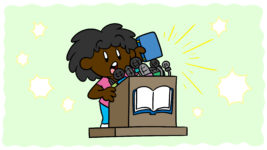When you think of LinkedIn, the social network for professionals, employers, and soon-to-be-graduating students desperate for a job, chances are you don’t think of writers, literary success, or even books. It’s difficult to imagine your target readership getting enthusiastic about their blossoming Network or spending hours trawling through market statistics (unless you’re writing business nonfiction, of course).
But while your readers might not be flooding LinkedIn looking for book recommendations (networks like Twitter, Tumblr, and Facebook are likely to be better choices for communicating with readers directly), there are other demographics lurking on LinkedIn who can prove incredibly useful in the long run.
When you’re publishing your own work, that’s exactly the kind of thing you need to know, so let’s see what LinkedIn can do for you.
To market or not to market?
One common mistake writers make when migrating to LinkedIn is to focus too much on marketing their own book. They’ll throw their standard tweet-length marketing spiel at the wall and wait to see what sticks.
But LinkedIn isn’t about direct marketing, it’s about networking. LinkedIn can help you establish contact with all kinds of useful individuals and companies, some of who offer useful services and others who may be able to influence your readership. LinkedIn lets potential contacts check you out before opening the lines of communication; in a crowded marketplace, that can make you a more tempting proposition for review, representation, and publication.
In general, you should always be on the lookout for perceived literary authorities, critics, bloggers, and other community influencers – after all, someone else recommending your book is always going to be more convincing than you recommending your book yourself.
For authors, LinkedIn is about networking over marketing.Click To TweetSome useful profiles to look for include:
Editors, agents, and publishing houses
The value of finding these individuals goes almost without saying. If you’re looking to find an editor who suits your needs or to publish traditionally, you’ll find hundreds of publishing houses represented on LinkedIn, as well as agencies, editors, and publicists. LinkedIn is a great way to read up on or get in touch with such individuals. Even if you don’t intend to message or research them, by connecting with them, you can ensure they at least see your professional and put-together profile, which may give you an edge in future. When your application does land on their desk, ensure it stands out by being someone they’re already aware of.
Book reviewers
In indie publishing in particular, book reviews are like gold dust (well, the positive ones anyway). But there are a lot of self-published books out there, and only so many book reviewers – finding someone with a following who’s willing to review your book is easier said than done, and LinkedIn can get your foot in the door and help you pitch in a less crowded environment.
Students and academics
Students and academics won’t be useful for everyone, but remember that universities are often keen to better integrate with the cities they occupy and engage with local artists. As such, English departments and students’ unions may be keen to feature you and your work in talks/events focusing on local literature. Of course, this’ll only be the case if you’re writing something suitably literary – you probably can’t count on your vampire erotica to garner much academic support.
Event organizers
If you live in a city, chances are there’s at least a fledgling literary scene within driving distance of you. Book fairs and other events often want local writers to participate, and local book shops will often be keen to host the book launches of local writers. LinkedIn can be a great way to introduce yourself to such organizers in a way that allows you to paint yourself in the best possible light.
It’s likely you’re within driving distance of a literary scene, and LinkedIn can help you navigate its benefits.Click To TweetBooksellers, librarians, and archivists
If you want your book in local bookshops and libraries, you’re going to have to ensure those in charge of book selection know you and your work. Bookshops and libraries have limited shelf space and limited funds, meaning you’re going to have to stand out – that’s where LinkedIn comes in. It can be a great way to present a carefully curated version of yourself and your work, granting you an edge over the competition.
Other authors
Talking to and connecting with other authors can be a wonderful way to foster a sense of community, learn, share work, and discuss the nuances of publishing. By utilizing LinkedIn’s Groups feature, you’ll be able to find and engage in dozens of communities full of knowledgeable and talented people who may have already gone through the publishing process. They may be able to answer your questions, offer advice, and even provide feedback on your work.
How to get the most out of LinkedIn
Now that we’ve discussed some of the useful people you can expect to find on LinkedIn, it’s worth spending a moment talking about how to use the platform to your advantage. Happily, LinkedIn is pretty simple to understand; anyone with a Facebook profile will be able to work out its basic features fairly quickly.
In order to get the most out of LinkedIn, you need to make sure you’ve filled out your profile with as much information as possible. This means a good, professional profile picture; a list of skills and interests; a declaration of what you’re looking for; and a fairly substantial biography (see 5 Crucial Tips To A Better ‘About The Author’ Page for advice on writing this). Not only will this impress connections who view your profile, but it’ll also increase the number of searches your profile turns up in, especially if you’ve done your homework and crammed in as many keywords as you can.
Unsure how to network as an author? LinkedIn is one of the best answers.Click To TweetBare in mind you can also host your work and list your books on your LinkedIn profile, and, unlike Facebook, links you share on LinkedIn (to, say, your own website or online portfolio) will count toward Google’s search algorithms, thus inching you closer to that hallowed first page of Google search results.
You should also be looking to join groups and communities; there are groups of creative writers, publishing professionals, eBook enthusiasts, editors, ghostwriters, etc., each of them full of interesting and potentially useful people.
Blog!
One feature that shifts LinkedIn away from Twitter and Facebook and toward sites like Medium and WordPress is its solid blogging platform. Wildly successful businessmen and politicians alike use LinkedIn to blog (their contributions quickly rising on LinkedIn Pulse, the site’s news aggregation feed), and while you’re unlikely to reach the Pulse feed (you’ll be competing with the likes of Barack Obama), LinkedIn’s advanced algorithm means that any blog content you produce is likely to find its target audience pretty quickly, especially if you’re savvy with your keyword use.
Blogging on LinkedIn is a fantastic way to get started as a blogger, and if you’re contributing articles that appeal to the site’s publishing and literary scenes, you’ll soon gain a following that’ll put you in a good position to contact publishing professionals and other literary gatekeepers (or even be contacted by them). Of course, it’ll also draw new people to your page, your linked website and portfolio, and, ultimately, your books! Check out How To Have Your Author Blog And Write For It, Too for more on this.
Join the community
Ultimately, joining LinkedIn should be viewed as joining a community; and, as with a community, you’ll get out of it what you put in. In order to reap the benefits, you have to put effort in: make a great profile, reach out to people, blog, make a name for yourself, embed links to your own work… above all, network. As with all things, successfully navigating the publishing journey often comes down to who you know.
While LinkedIn looks like it’s designed for the kinds of people whose ideal Friday night has something to do with spreadsheets, it’s in fact a rich environment for we creative types. As long as you don’t treat it like just another marketing opportunity, you’re sure to find valuable content and people.
Are you on LinkedIn? (If you are, stop by our LinkedIn page and say hello). How has it helped you as a writer? Let me know in the comments, and check out Waste Less Time On Social Media With This One Little Trick and Grow Your Author Brand Through Networking. Here’s How for more great advice.






2 thoughts on “Is LinkedIn Really An Asset For Authors?”
I like your statement of joining Linkedin is like joining a community, and the idea of having to put something into it to get something out, that’s really important! While I have found Linkedin useful in some ways, I do find it has a lot of limitations. Mainly a lot of individuals have a Linkedin profile, but only a small fraction of them use it regularly. I’ve noticed that the people using it are mostly looking for a job, or looking for an employee. Great read and interesting take on connections on Linkedin!
Thanks for your comment! You’re quite right about LinkedIn’s limitations–it is rather cliquey, with an unusually clean cut between active users and those with dead accounts. Still, there’s value there if you know where to look.
Best,
Fred